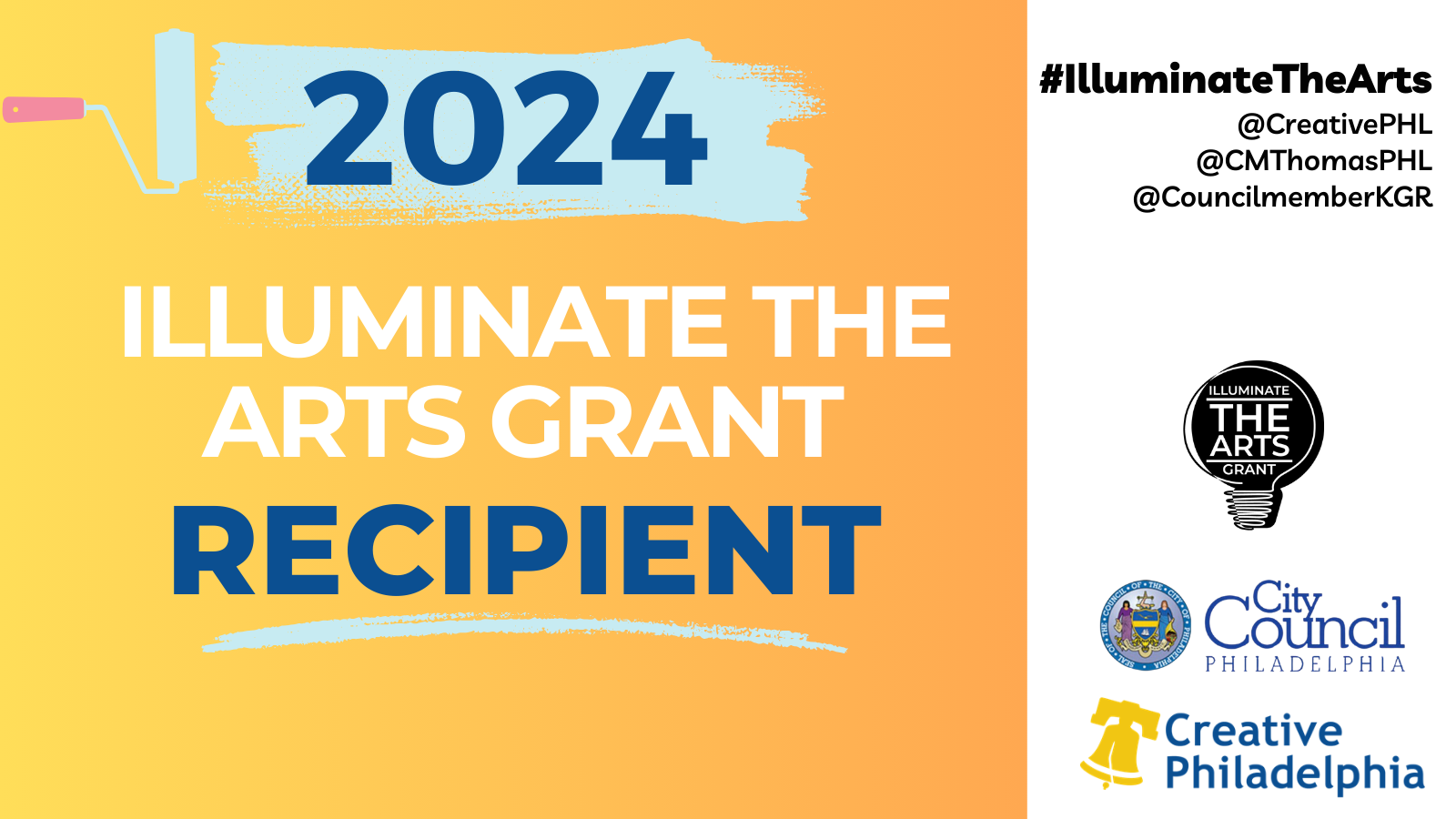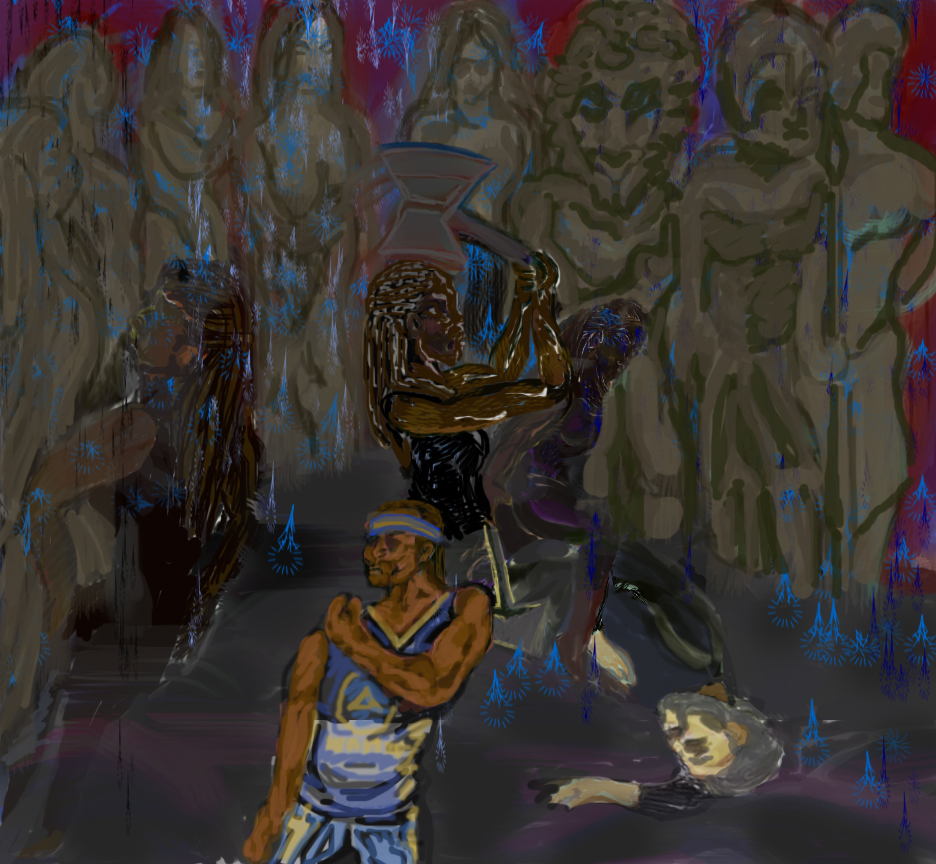
New York Theater Workshop
“The Half-God of Rainfall” by Inua Ellams
The play, The Half-God of Rainfall, by Inua Ellams takes us on a spiritual journey. It showcased diverse divine systems of gods and goddesses that protect their devotees. At the end, a lesson learned about superiority took the form of the afterlife as a triumphant spiritual resolution. A history of ancient times which intime becomes mythology continues to apply to the modern world. Diverse cultures can be seen in a journey into mythology through ancient times. As in an epic cycle, the actors transformed emotionally and physically. We began to recognize two opposing forces, the rebellion against an ungodly power over the universe, and the divine protection over a heroic character.
In the competition between humans there are their respective mythological creations, and sometimes there are hidden desires. For instance, a hidden jealousy could be translated to a fight with this human emotion by a god or goddess’s position in the story. As in the clash of the Olympian gods, and the Yoruba Orisas, the gods and goddesses of Yoruba. With this in mind, it was simply a vision of mythology translated for a diverse community to come together around the stories of ancient history. It presented the possibility of archetypal superheroes. After watching the gods and goddesses appear on stage, the layers of myth-making change in appearance by their stylistic choices from mortal to immortal, or from dreaming to reality.
Humanity believes in myths for the support of a whole group of people living with a common goal of good over evil. This irrational substitution of gods and goddesses for superheroes in the drawings, presented a means of interpretation for the play, that shows cultures’ mythological creatures demonstrate how cultures express their differences. In such a translation of myths, thus Yoruba divination can be seen as superheroes, sports legends, like the Greek mythology we all know by virtue of a popular Classical style in art history.
At the start, a scene of interconnected players, like a team facing off against various mythological creatures. The viewer was able to distinguish between the empowered half-god and the gods and goddesses in full regalia. When perceived as these levels of separation that appear in competition for control over nature, to organize the existence of free will over happenstance. It was the origin of a creation story before us and the beginning of an urban legend. In the face of death, human life is taken as part of nature in the grand scheme of universality, like human sacrifices, or just plain bad faith understood within these layers of spiritual, physical, and social aspects to all humanity.petition between humans there are their respective mythological creations, and sometimes there are hidden desires. For instance, a hidden jealousy could be translated to a fight with this human emotion by a god or goddess’s position in the story. As in the clash of the Olympian gods, and the Yoruba Orisas, the gods and goddesses of Yoruba. With this in mind, it was simply a vision of mythology translated for a diverse community to come together around the stories of ancient history. It presented the possibility of archetypal superheroes. After watching the gods and goddesses appear on stage, the layers of myth-making change in appearance by their stylistic choices from mortal to immortal, or from dreaming to reality.
Ellams’s poetry offered sports in place for power, success, or talent determined to battle in the games with the gods from mythology. In a story to define power by its system of spirituality, Demi, played by Mister Fitzgerald, is the Half-God of Rainfall. It was his fate to play basketball, guided by Modúpé, his mother who fought for the god’s approval. Gods playfully bartered with humanity by testing their skills, like in Olympic games. Such as the Greek myth of Phaethon, son of Apollo who rode his father’s chariot too close to the Sun. The Greek Pantheon and Yoruba spirits and ancestries in the Orisas of the Other world, exist altogether in rivalry. The perspective of the black woman, and given the disadvantages of a diverse world we considered the mixed emotions of sexism and racism. Often we see a maternal power of black feminism, but misunderstood in a pre-existing system of social and political life. The political forces took form in a contemporary stylation of the past religious belief system for a dreamlike personal reflection on childhood dreams.
We entered the Yoruba world, symbolism and iconography are told through a tradition of incantations and poetry. This initiation of mythology by two extensions from ancient philosophy, one being the Greek Pantheon, and the other from African thought. This restored a display of morality, and equality which negates any disbelief of the Other. It was the mother of Demi, and her worship of a personal deity, Osún, that regained order in the cosmos for the black feminine identity in reestablishing traditional African beliefs.
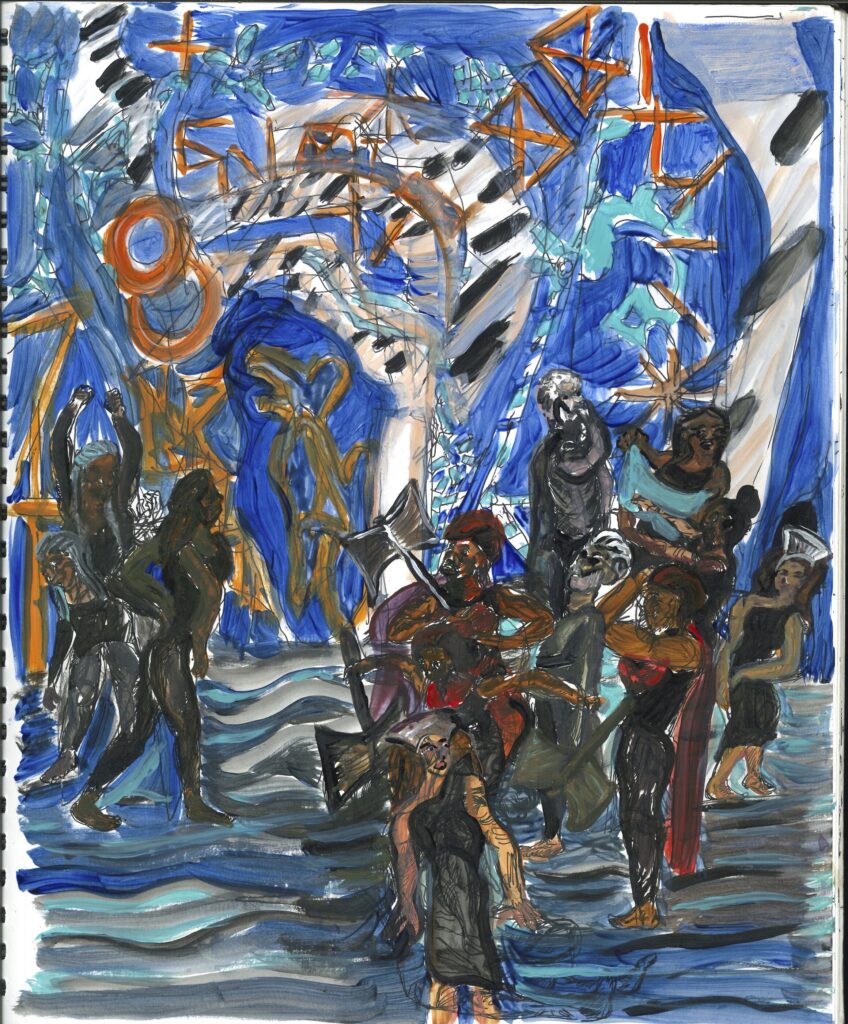
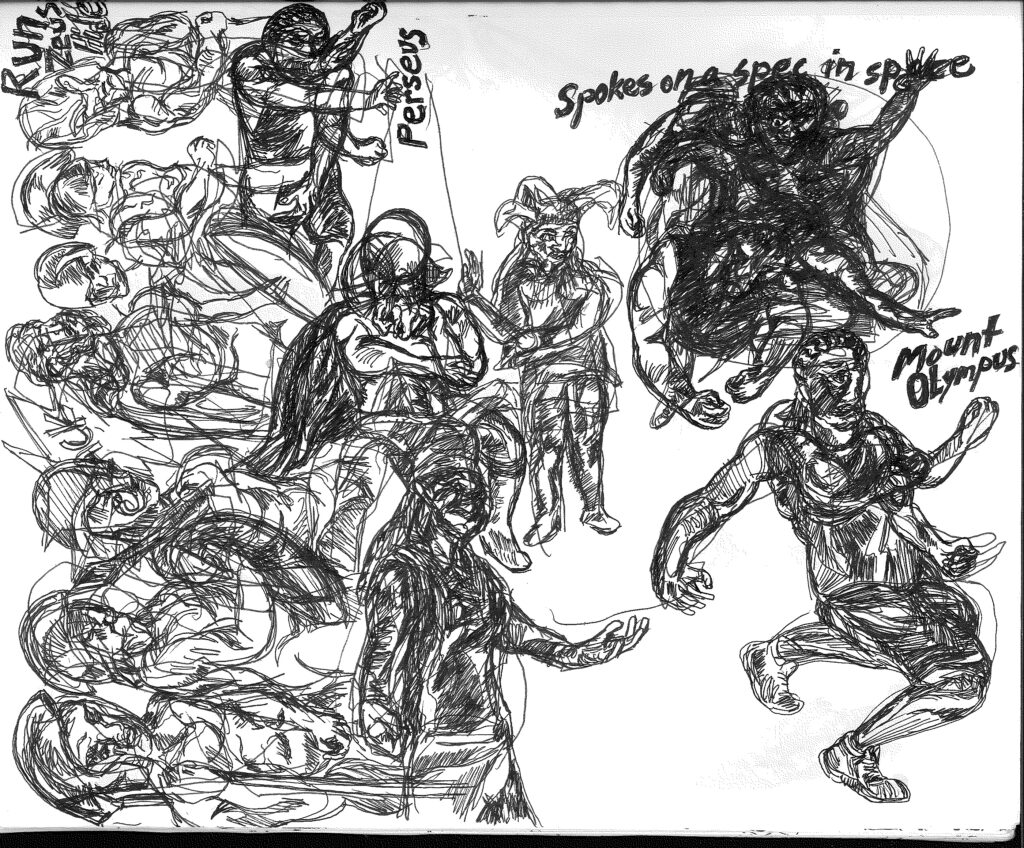
Our connection to the Other world of Orisas and African ancient spirits filled the space. Demi’s story in, The Half-God of Rainfall, traces his lineages to the source of his character within the birth ritual of naming the newborn present in the “imori” tradition. The disruptive influence of a rape in the mix of ancestral traditions created the epic’s personal trauma with Modúpé, played by Jennifer Mogbock. In the worship of Osún, the Goddess of the Niger, there is the matriarch intervening in this spiritual strengthening of Modúpé. She is a victim, under a shadowy sentiment stained by a traumatic event. The story of Demi and his mother fight for responsibility and accountability for a god who thinks he can do whatever he likes. The callous Zeus, played by Michael Laurence, stood
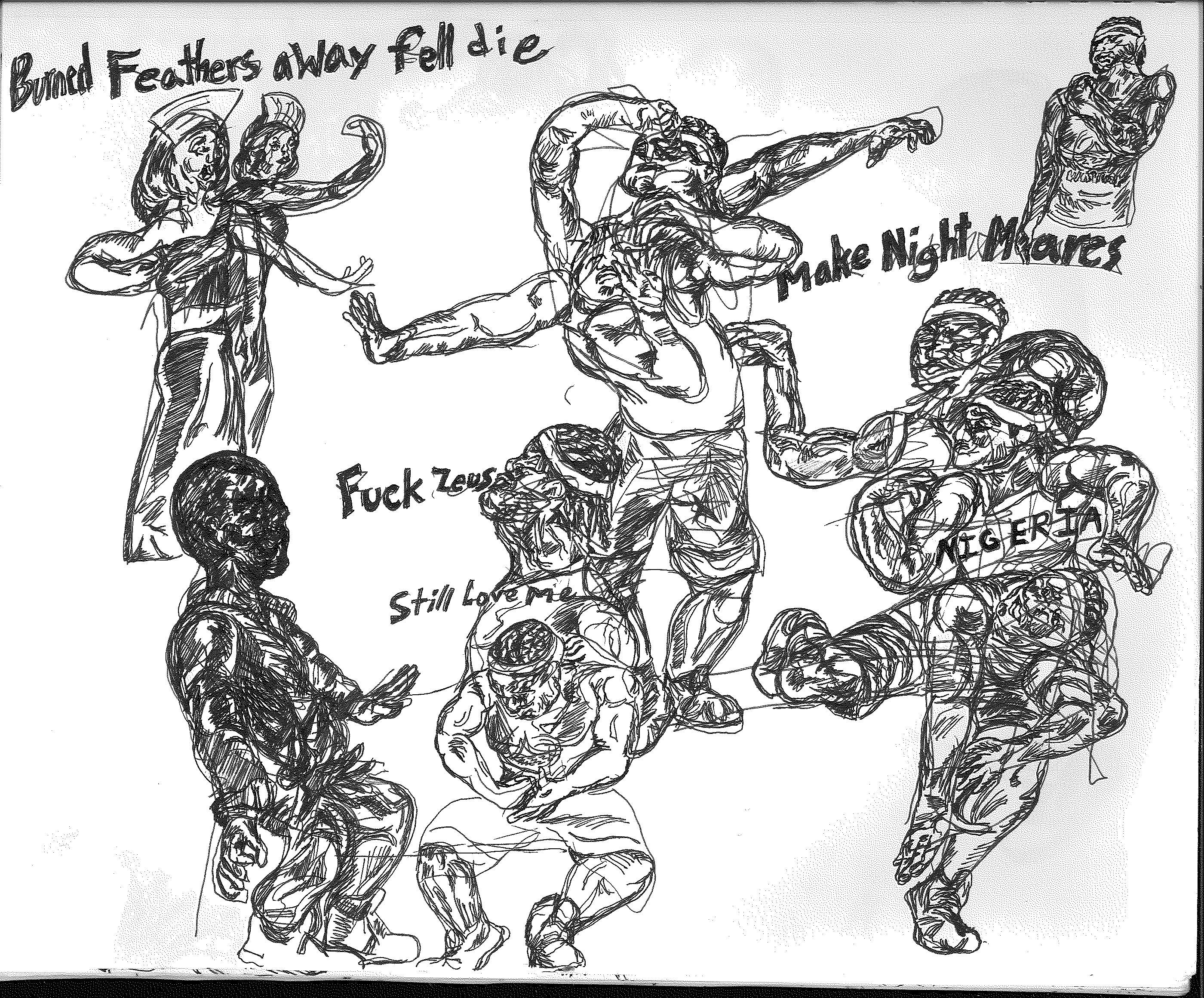
with a shuddering chill over the scene, and in the position of power. The patriarchy personified this destructive force of nature. This time nurturing Yoruba myths showed a feminine nature that defeated the masculinity of Zeus. The feminine nature that regenerates life in the world became this devotional power by the protection of Osùn, played by Patrice Johnson Chevannes. In the conflict, the triumph of the spirit of Demi was killed but not entirely forgotten. The triumph over injustice comes in the shape of rain.
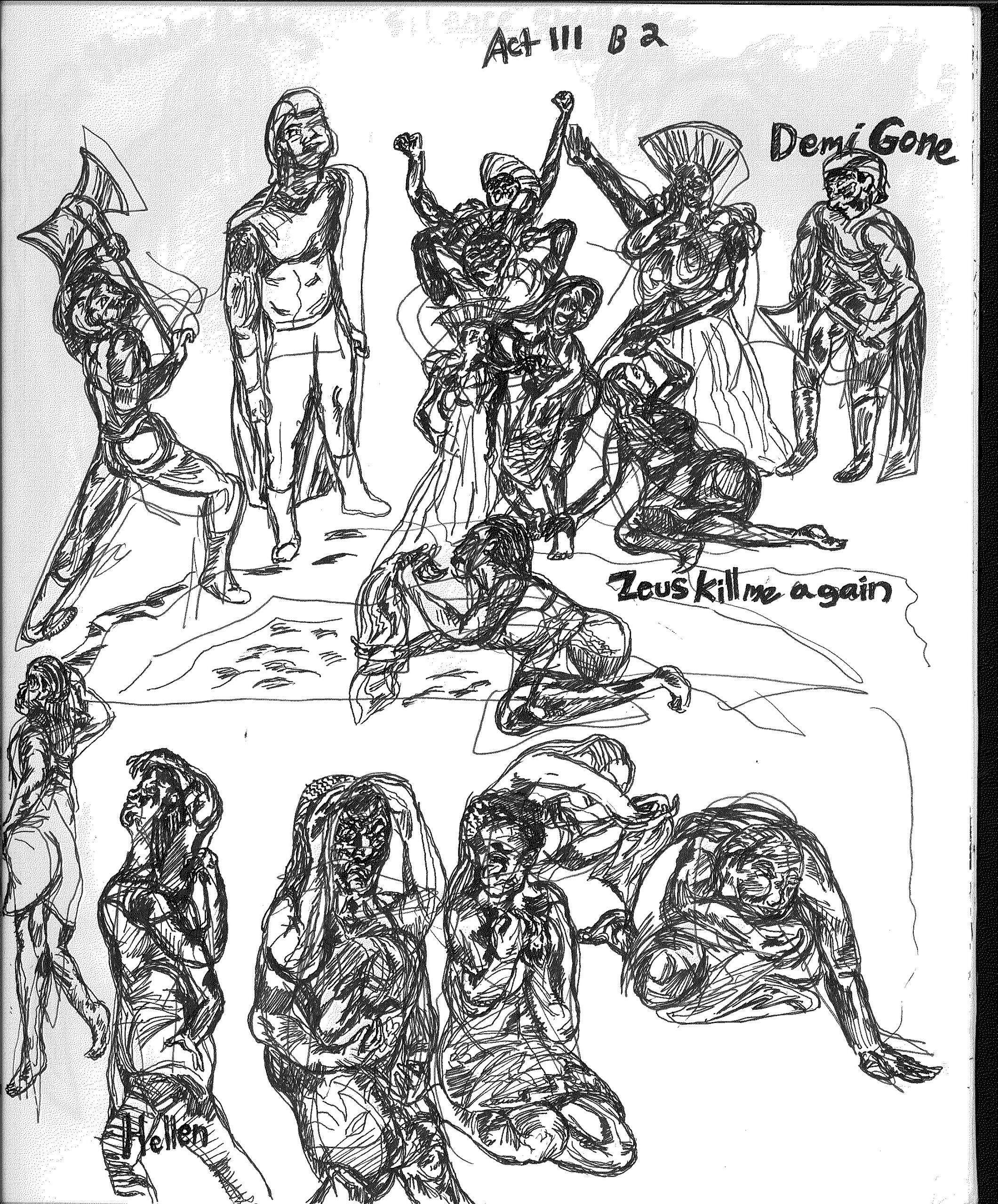
Nature vs. nurture was an objective for drawing superheroes to understand the godly forces on stage, and a personal reflection of childhood dreams. Demi’s destiny as the half-god of rainfall appropriated a key symbol of the Golden State Warriors in the narrative of an athlete, celebrity, or role model that is bigger than life. Narrated by Hera, played by Kelley Curan, who appears in multiple roles including, wife of Zeus, goddess of women, commentator, interviewer, and a part in the crowd of fans as we embark on the U.S.A with Demi in the NBA; they unleashed a comparable depth and mysticism as we ventured to Mount Olympus. A poetic anger that grew more serious in tone forms as the more humorous trials of the gods prepare us for a range of human emotion. A repressed anger of opposing forces at war, substituted by teams’ names, their mascots and team colors, or the roar of fans in a sports stadium drew us to this counting down to an ultimate ending for our hero.
The Portrayal of superheroes in an epic downfall of a half-god was heightened, at the importance of an afterlife for our epic hero. We are left with uncertainty, and a pointed traumatic ending of Modúpé that took place. Demi’s divination materializes in the rain. The configuration on stage relayed a dream state, and the worship of Osún was equivalent to making sense of what we already know through drawing from our own personal experiences. The exchange of cultural appropriation was a lasting presence of a spiritual guide; the essence was naturally built to support all evocations of a personal journey, without undermining personal beliefs by reason, and more coincidentally, occurring simultaneously to acknowledge bewildering prejudices. Like the out-of-body experience of Modúpé which felt freeing, took precedence over her adversity, reached ecstasy, and it empowered her against Zeus, the Greek god of thunder. Lastly, a sentiment of justice and piety put a pause to reality.
By Yoruba beliefs, Sango is the husband of Osún, and the god of thunder. Sango, played by Jason Bowen, bursted with energy, a flash of light here and there, with a wavering red cape. He was masked with humor and playfulness in games with Zeus that sent a sense of ease, so much that I drew a visualization of superheroes. It was completely natural for me, and how fascinating it was, this connection with my childhood dreams.
“Why Do We Study Myths?”
In Yoruba ceremonial arts, there are poetic incantations that perform the ideals of the ethical gestures of wisdom in Yoruba belief. On stage at the New York Theater Workshop, during the weaning summer months of July and August 2023, the projection art by Tal Yarden presented a design which looked carefully toward the medium and its setting prior to the play itself. The digital collage of DNA in a geometric pattern construed as a cosmos, braided intricately to African hair culture in constellations, or cave drawings that sketched or weaved our ancestors’ observations into this physical world. It drew together materials for sacred purposes pointing to the Kuba Cloth, of the Shoowa people. A connection of heritages in tribal, or primitive arts which has its place in a state of duty to civilization, and involves generations, traditions, and archetypes weaved together to form these rites of passage. The creation of arrangements in Kuba cloths, and its relationship to the archeology of Nigerian art shows similar sacred objects, and the weaving of raffia palms for family lineages helps to look critically at the mode of performance, and its subjective purposes. In modern technology, for example, the mode of multimedia for groups of people collectively in the internet age gives agency to identify with others, and takes on new modes of performance for kindred spirits. While looking at the influences behind the play, it became more evident as one became more aware of Yoruba mythology. Their forms, at first glance were unfamiliar or inaccessible, and once brought into perspective with its actors, it organized African thought for a comparable dream state of popular thought. It actively questioned the possibilities for myths in society, and framed a geographical position for restoring a strong feminine deity displaced in an existing hierarchical system within western thought.
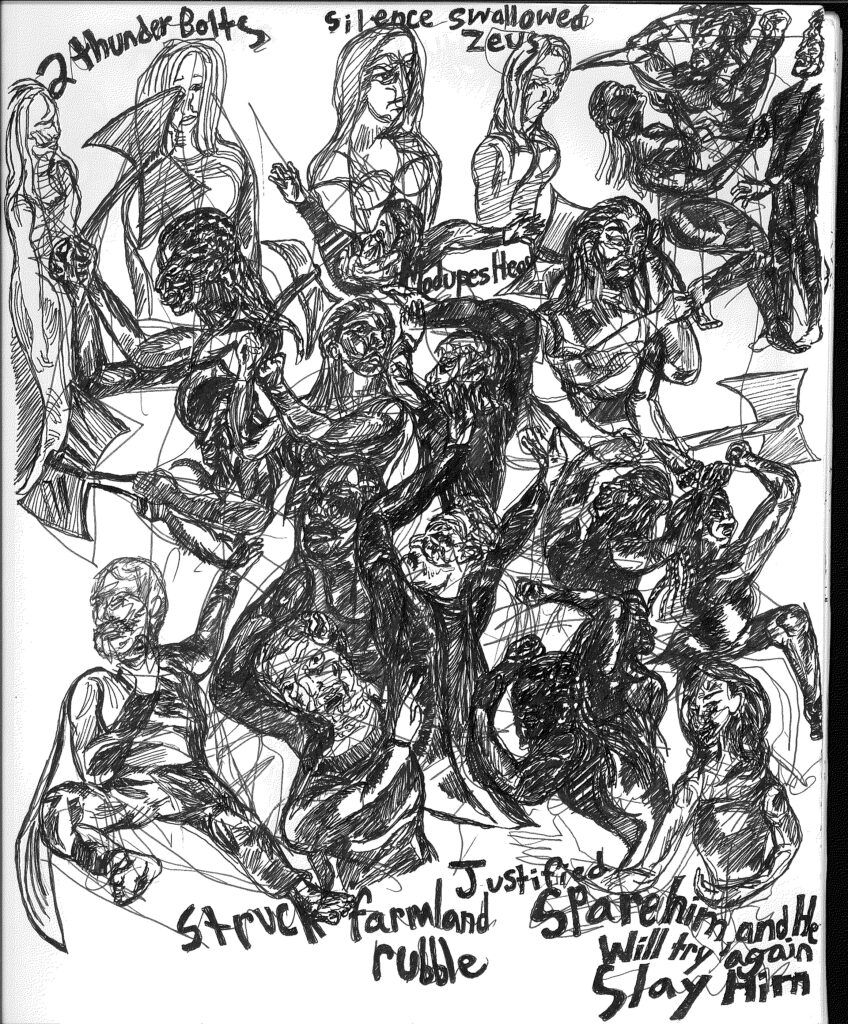
Yoruba culture and the African diaspora gave us another trial, of a Nigerian boy that grew up, traveled to the U.S, and goes on to play in the NBA for his claim to fame in the international games for the Nigerian basketball team. Acknowledgement of the Greek gods and goddesses that appear in the play at best represent a patriarchal history of the western world. It was the basis for our conflict between two mythologies. A confessional moment between Jason Bowen and Mister Fitzgerald clearly defined the boundaries set forward for half-gods. They revealed begotten fame, love, and ecstasy, yet it was all hindered neither for mortal gains, nor an emphatic goal, to reveal a diversity in a chaotic world. Zeus’s power is the upper hand that obstructed Demi’s dreams for playing basketball, as in an ironic misogynistic system gone to disarray. It playfully mirrored tyranny in an autonomous fashion that went against a preconceived social order or a humane code of conduct. This hypocrisy metaphorically narrates the multiplicity of genres; modes of athleticism and heroism in good faith portrayed by the obstacles against one’s free will. The everlasting afterlife of Demi, and justice served by the hands of his Yoruba mother that nurtured his myth are acts of piety; other times these myths share a similar transcendence of childhood dreams which are lost, but not forgotten. In pluralistic society, an agent of change can be misconstrued by a system polarized by diversity for illegitimate reasons.
A viewpoint of rebellion, or this reaping revenge for one’s free will from a dogma of unacceptable behavior, shows the disadvantages and sacrifices for classes of migrant identified groups, such as the African diaspora and the spread of Yoruba culture. We become entranced by their strength, and the athlete is personified in the appropriation of the warrior that Demi represents. A diverse world transcends our own familiarity, and in its interpretation is drawn with the aid of superheroes to represent the worship of divine spiritual protection. The simplicity condensed in the multiplicity of diversity compared to a clashing of opposing myths, genres, and viewpoints.
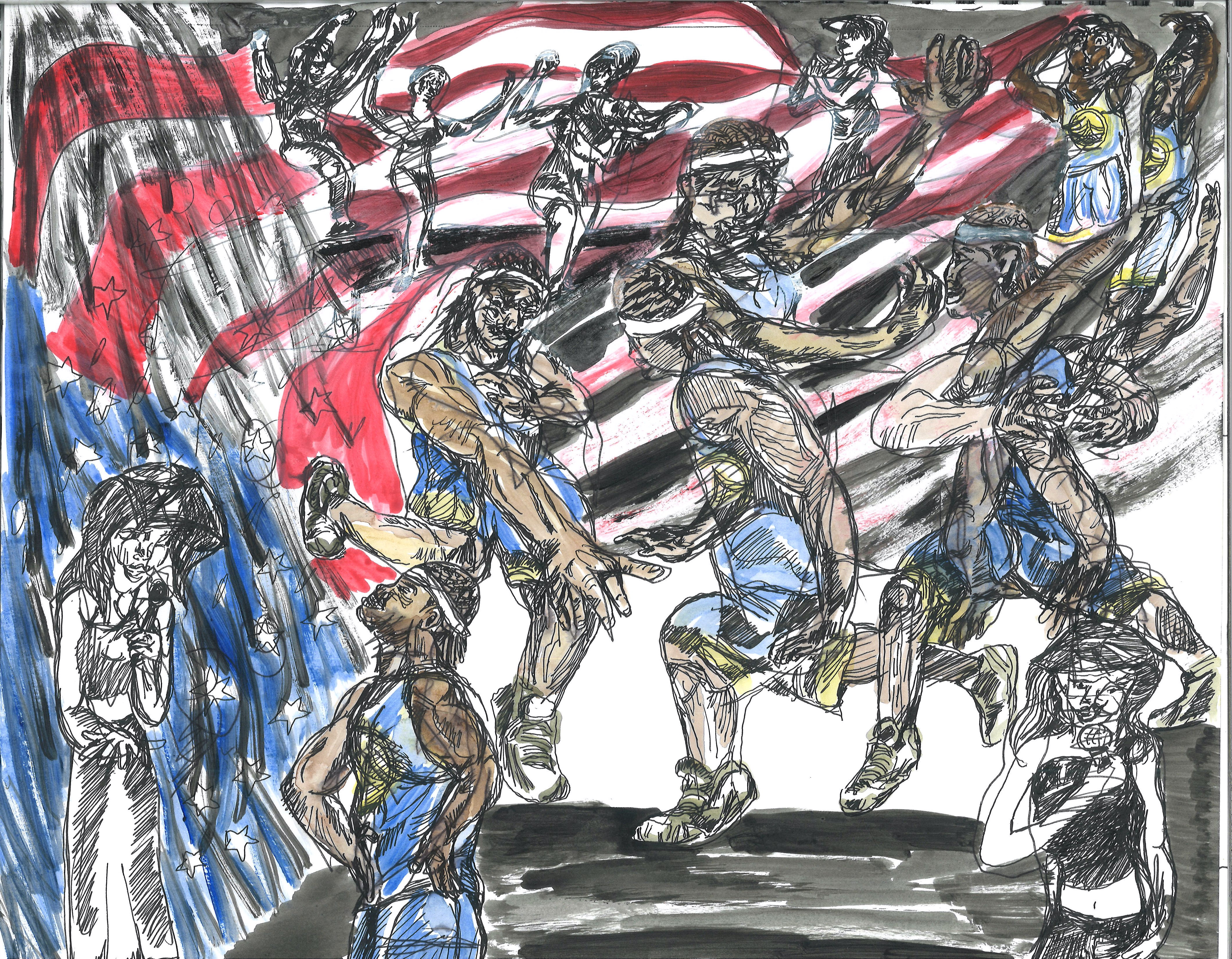
Adhering to Yoruba thought, one’s character, is seen as a life force or capacity, called “ase,” in the Yoruba world, empathized in the details of naturalism. The epic downfall presents another redemptive quality for the role of the Yoruba woman. There is a destructive force in nature that divides people by our own competitiveness. Whether in sports, in politics, in religions, or even greater ideological differences between people. The external forces that can be seen to divide us can leave us unknown to their source of origin.
The moral tag for myth-making in the modern world came in our introduction of Elegbra, the messenger God in Yoruba mythology, played by Lizan Mitchell. This point of view narrated an omniscient perspective for the narrative, while also aligning a scale for a bigger than life movement. For one, warring cultures or opposing basketball teams, and secondly how they may weigh against different realities, such as, superheroes or myths. Mitchell plays Elegbra, the role that comes between the humans and the spiritual world. Elegbra is also known to sometimes cause mischief or aid in human matters, or sometimes they play tricks on the vulnerable mortal beings. Mitchell has this line at the beginning of the play, “We must avoid conflict by all means possible.” The matriarchal powers in the Yoruba faith came to be nurtured, and a form of aggression that overcame the flow of nature for justice. The supernatural in Yoruba mythology reconstructed the pathways for understanding “ase,” and allowed equality to exist in diverse worlds based on moral character.
The amazing break away in this play was in the match up of gods and goddesses, their control over human life which builds over layers of raw human emotion, and our myths emulated nature. What differentiates the derivative nature is our willingness to nurture customary beliefs, and defend our social being in society. A representation of popular beliefs, Yoruban spirits and divinity, and the whimsical imagination intertwined within mythology was preserved in my drawings from the play. In their similarities, myth-making reflected my childhood dreams of superheroes and villains that depicted the elusive, yet often the illicit threat of the unknown. It was at Demi’s lowest point that left us with a grim reaper reimagined in his vengeance for the game. This dramatic change in character was pivotal for the humor in all seriousness. The gravity was taken out of his basketball, literally making his ball fall short to the basket, and his ‘air balls’ fell flat.With this characterization for our epic hero, we looked toward Modúpé with the spiritual guidance from Osún by her side. The rivaling display of naturalism, and a nurtured value in good faith appeared in warring mythologies. Perhaps, how the half-god became the God of Rainfall, was the downfall of the visceral heroic stature for an overarching feminine aptitude.
